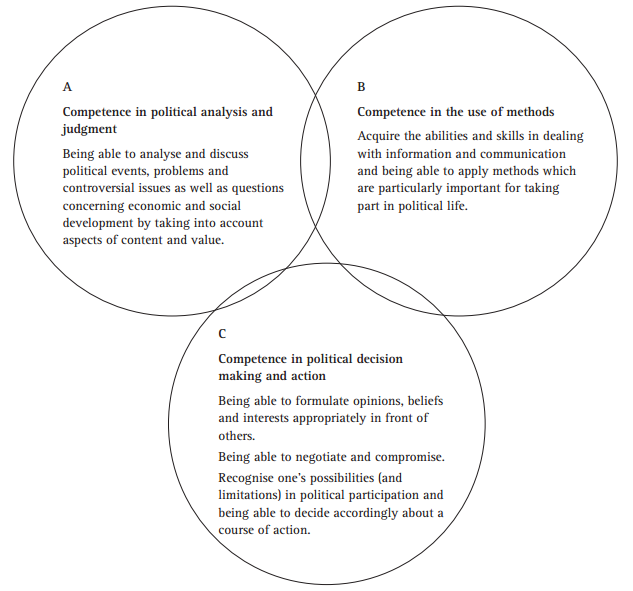2 – Work file 1: Students’ competences for EDC/HRE
Living Democracy » Textbooks » Educating for democracy » Part 2 – Teaching democracy and human rights » Unit 2 – Setting objectives and selecting materials » 2. Task and key questions for setting objectives and selecting materials » 2 – Work file 1: Students’ competences for EDC/HREThree areas of competence for living and learning democracy and human rights education
The aim of Education for Democratic Citizenship is to support the development of competences in three areas, which, however, are always strongly interconnected and therefore should not be treated separately.

Competence in political analysis and judgment
The aim is to develop the competence to analyse political events, problems and controversial issues and be able to explain the reasons for one’s personal judgment. School can contribute to this process by supporting students to use structured analysis to attain a more sophisticated understanding of matters.
In order to be able to do this, the following skills are necessary:
- recognising the importance of political decisions for one’s own life;
- recognising and judging the consequences of political decisions;
- recognising and presenting one’s personal point of view and the point of view of others;
- recognising and understanding the three dimensions of politics:
a) the institutional,
b) the content-bound,
c) the process-oriented dimension;
- analysing and assessing the different phases of political processes at micro-level (for example, school life), meso-level (for example, community) and macro-level (national and international politics);
- presenting facts, problems and decisions with the help of analytical categories, identifying the main aspects and relating them to the fundamental values of human rights and democratic systems;
- identifying the social, legal, economic, ecological and international conditions, interests and developments in the discussion about current controversial issues;
- recognising the way politics are presented by the media.
Competence in the use of methods
In order to be able to take part in the various political processes not only basic knowledge about political contents, structures and processes are needed but also general competences which are acquired in other subjects (such as communication, co-operation, dealing with information, figures and statistics). Special abilities and skills such as being able to argue for or against an issue, which are particularly important in taking part in political events, must be trained and promoted in Education for Democratic Citizenship. The aim is to use these skills in methods which are widespread in the political discourse (discussions, debates).
In order to be able to do this, the following skills are necessary:
- being able to find, select, process and present autonomously information given by the mass media and/or new media in a critical and focused manner (collect, organise, evaluate statistics, maps, diagrams, charts, caricatures);
- using the media with a critical eye and being able to develop one’s own media products;
- applying empirical methods in a basic way (for example, survey and interview techniques).
Competence in political decision making and action
The aim is to acquire the competences to appear and act in a confident and adequate manner in the political context and in public.
In order to be able to do this, the following skills are necessary:
- being able to voice one’s political opinion in an adequate and self-confident way and to master different forms of dialogue;
- taking part in public life and being able to act politically (oral communication skills such as explaining one’s point of view, discussing, debating, leading or moderating a discussion; written presentation and visualisation techniques for posters, wall newspaper, minutes of a meeting, letters to the editor, etc.);
- recognising one’s own possibilities to exert political influence, forming a team and working together;
- asserting oneself, but also being able to compromise;
- recognising anti-democratic thoughts and tendencies and being able to respond to them adequately;
- being able to behave naturally in a intercultural context.

